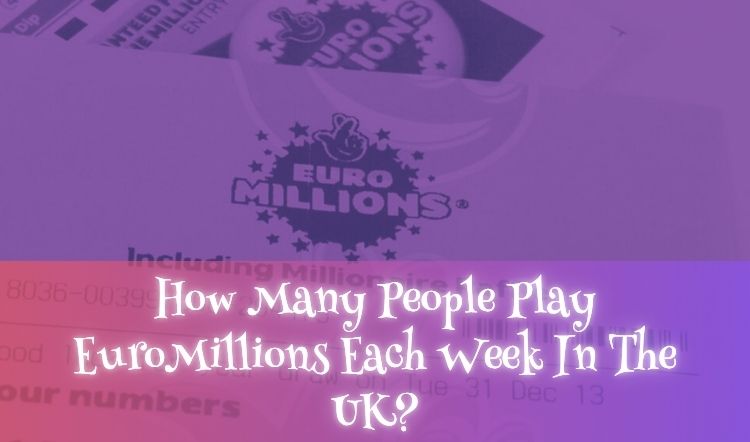
The EuroMillions is a lottery game available in nine European countries, including the United Kingdom. It gives players the opportunity to try and win different levels of potential cash prizes by selecting five main numbers and two additional numbers, known as Lucky Stars. Draws take place twice a week, every Tuesday and Friday.
In the UK, the EuroMillions remains one of the most well-known lottery games. While exact weekly player numbers are not published, millions of tickets are sold across Europe each week. Ticket sales in the UK often increase when the jackpot grows significantly, which shows how the size of the top potential prize can influence interest.
This blog explains how the game works, how many people take part in the UK, what the odds of possibly winning are, how frequently jackpots may be won, and how player interest differs between countries. If you’re considering taking part, or are simply curious, understanding these details can help you decide whether this game fits into your entertainment budget.
How Many People Play The EuroMillions on Average?
The EuroMillions is played in Austria, Belgium, France, Ireland, Luxembourg, Portugal, Spain, Switzerland, and the United Kingdom. The game’s popularity varies across these countries, influenced by factors such as population size and cultural attitudes towards lotteries.
In the UK, the EuroMillions is a well-established lottery game, with many individuals participating regularly. While exact figures fluctuate, the consistent interest in the game underscores its widespread appeal.
What Are Your Chances of Winning EuroMillions?
The EuroMillions offers 13 prize tiers, with varying odds of winning:
-
Jackpot (5 main numbers + 2 Lucky Stars): 1 in 139,838,160
-
5 main numbers + 1 Lucky Star: 1 in 6,991,908
-
5 main numbers: 1 in 3,107,515
-
4 main numbers + 2 Lucky Stars: 1 in 621,503
-
4 main numbers + 1 Lucky Star: 1 in 31,076
-
3 main numbers + 2 Lucky Stars: 1 in 14,126
-
4 main numbers: 1 in 13,812
-
2 main numbers + 2 Lucky Stars: 1 in 986
-
3 main numbers + 1 Lucky Star: 1 in 707
-
3 main numbers: 1 in 314
-
1 main number + 2 Lucky Stars: 1 in 188
-
2 main numbers + 1 Lucky Star: 1 in 50
-
2 main numbers: 1 in 22
Overall, the odds of potentially winning any prize are approximately 1 in 13 .
It’s important to understand that the EuroMillions is a game of chance, which means that there is no certainty of winning any prize, regardless of how many tickets are bought or how often you play.
How Often Is EuroMillions Won?
The EuroMillions jackpot is won when a player matches all five main numbers and both Lucky Stars. If no ticket matches all seven numbers, the jackpot rolls over to the next draw, increasing in value.
This rollover can continue until the jackpot reaches its cap, currently set at €250 million. Once the cap is reached, the jackpot can remain at that level for up to four draws. If still not won, the entire jackpot amount is distributed among the winners in the next prize tier with winning tickets.
This system means that while the jackpot may not be won in every draw, it is claimed periodically, depending on ticket sales and number combinations drawn.
Which Country Buys The Most EuroMillions Tickets?
The EuroMillions is played across nine European countries: Austria, Belgium, France, Ireland, Luxembourg, Portugal, Spain, Switzerland, and the United Kingdom. Among these, France, Spain, and the UK are notable for high participation rates.
Among these, France, Spain, and the UK are notable for high participation rates.
France often leads in ticket purchases, attributed to its large population and the lottery's strong presence. Spain also sees considerable engagement, with many players participating alongside other popular local lotteries. The UK sees strong participation in the EuroMillions, with a large number of people choosing to take part in the draws each week.
These countries' significant contributions to ticket sales reflect the game's popularity across Europe.
Is The EuroMillions Worth It?
Deciding whether to participate in the EuroMillions depends on personal preferences and financial considerations. Some individuals view it as a form of entertainment, enjoying the anticipation of the draws and the possibility of winning a prize. Others may participate as part of a social activity, such as joining a syndicate with friends or colleagues, which can add an element of shared experience.
It's crucial to recognise that playing the EuroMillions involves spending money on a game of chance, where any winnings are not guaranteed. Therefore, it's advisable to set a budget for such activities and ensure that participation does not negatively impact your financial well-being. If you choose to play, consider it as part of your entertainment expenditure and play responsibly.
EuroMillions vs Lotto: Which Is Better?
The EuroMillions and the UK National Lottery's Lotto are two distinct games, each with its own characteristics:
-
EuroMillions:
-
Played across multiple European countries.
-
Offers larger jackpots, with the potential to reach up to €250 million.
-
Draws occur twice a week, on Tuesdays and Fridays.
-
The odds of winning the jackpot are approximately 1 in 139,838,160.
-
-
Lotto:
-
A UK-based lottery game.
-
Offers smaller jackpots compared to EuroMillions.
-
Draws take place twice a week, on Wednesdays and Saturdays.
-
The odds of potentially winning the jackpot are approximately 1 in 45,057,474.
-
Choosing between the two comes down to what matters more to you — the larger potential jackpot amounts offered by the EuroMillions, or the different prize structure provided by Lotto. Whichever you decide to play, it’s important to remember that both are games of chance, and taking part should be done in a way that’s responsible and within your budget.
*All values (Bet Levels, Maximum Wins etc.) mentioned in relation to these games are subject to change at any time. Game features mentioned may not be available in some jurisdictions.
**The information provided in this blog is intended for educational purposes and should not be construed as betting advice or a guarantee of success. Always gamble responsibly.
